‘Tár’ seeks to unscramble one’s motivations
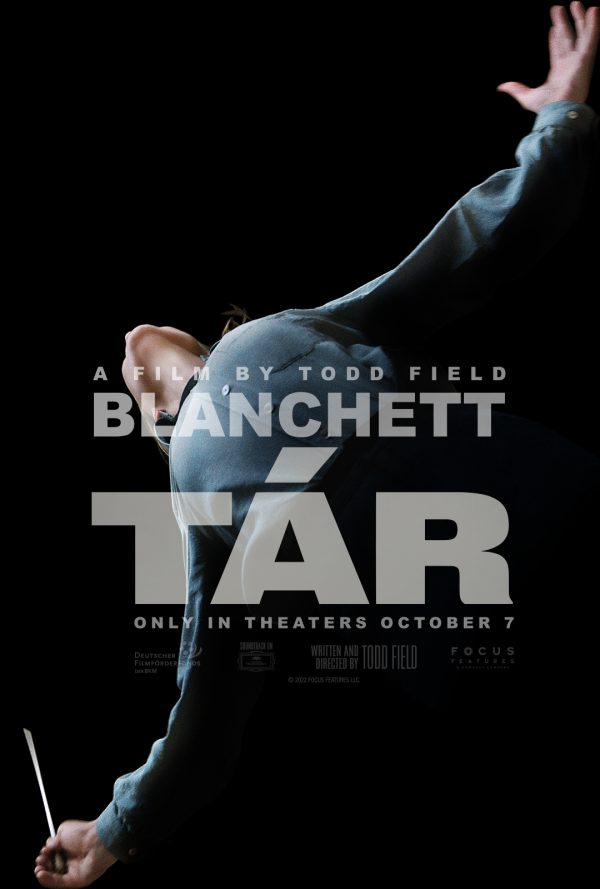
“Tár” (2022). Cast: Cate Blanchett, Noémie Merlant, Nina Hoss, Sophie Kauer, Mark Strong, Julian Glover, Adam Gopnik, Allan Corduner, Mila Bogojevic, Sylvia Flote, Fabian Dirr, Zethphan Smith-Gneist, Tilla Kratochwil. Director: Todd Field. Screenplay: Todd Field. Web site. Trailer.
Lydia Tár (Cate Blanchett) has made quite a name for herself. The internationally renowned conductor has taken the classical music world by storm, leading some of the globe’s most prestigious orchestras. She has also composed her own pieces, established initiatives to support world musicians and landed a position teaching aspiring conductors. In addition, Lydia has overseen the production of an extensive repertoire of recordings, most notably all but one of the symphonies of Gustav Mahler. And, as her story opens, she’s preparing to complete the composer’s symphonic catalog, teaming up with the Berlin orchestra to record the final work, the Mahler fifth.
Lydia has established such a celebrated reputation thanks to her interpretation of the pieces she records and conducts. She has widely discussed how she seeks to express the transcendent language of music through her work, bringing about the feelings that music generates that can’t be adequately put into words. It’s a process that affects her deeply as she attempts to transform these emotions into tangible musical expressions that are meant to be felt and experienced, even if they are incapable of being described linguistically. It’s a way of looking at music that has set her apart from her peers, many of whom are in awe of what she has been able to accomplish in this regard, especially since they are fundamentally unable to re-create it themselves.
Lydia knows all this, too, and makes no particular effort to hide her self-awareness of it, well-practiced false humility notwithstanding. But, despite her efforts to maintain an agreeable, acceptable public image, Lydia quietly has earned a reputation as someone who gets what she wants, even if it sometimes calls for her to play the role of shark. This is true in both her professional and personal endeavors, too. If she needs to throw someone under the bus, she’ll do it. Of course, she’ll do whatever she can to cover her tracks or to put a good face on her actions. But those closest to her can see what she’s doing, and they’re not particularly approving.
For instance, when it comes to getting what she wants, Lydia frequently taps her assistant, Francesca (Noémie Merlant), to carry out her orders (i.e., do her dirty work for her), often with the vague promise of coveted rewards, many of which don’t materialize as hoped for. And, if a scenario calls for her own direct involvement, she’ll often seek to bring outcomes into being by tactfully manipulating others to her advantage, as she does through carefully coordinated interactions with orchestra peers like Sebastian Brix (Allan Corduner), Elliott Kaplan (Mark Strong), Andris Davis (Julian Glover) and Knut Braun (Fabian Dirr), many of whom don’t realize they’ve been railroaded until it’s too late.
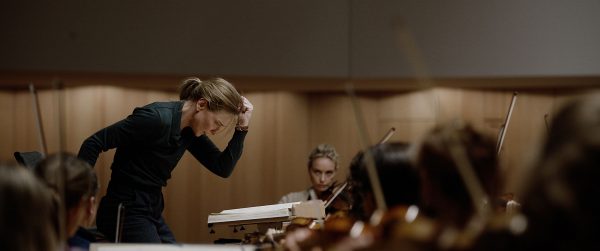
The same is true in Lydia’s home life. Her long-time partner, Sharon (Nina Hoss), patiently dotes on her and cares for the well-being of their young daughter, Petra (Mila Bogojevic), keeping the household running while the maestra is away on her many business trips. Sharon is also a loyal, dutiful musical collaborator as the orchestra’s concert master (one can’t help but wonder how she landed that position), respectfully following all of her partner’s requests and commands in the concert hall. But, despite Sharon’s personal and professional devotion, it doesn’t stop Lydia from allowing her eye to wander, such as when a new cellist, Olga (Sophie Kauer), arrives on the scene. Lydia makes no attempt to conceal her attraction to the new girl in town, making things uncomfortable for both Olga and Sharon.
It’s not entirely clear why someone like Lydia, who potentially has so much to lose, could act so carelessly, callously and irresponsibly, but that’s who she is. Perhaps she feels a sense of entitlement for her many artistic achievements. Maybe her status as a celebrity and distinguished intellectual has caused her to lose touch with common courtesy and everyday etiquette. Or it just might be that she’s a self-centered, self-absorbed bitch. Whatever the case, though, it becomes apparent over time that she’s becoming increasingly oblivious to and detached from the practices of civilized behavior, as well as her connections to those whom she supposedly cares most about.
It would seem that Lydia’s due for a healthy dose of comeuppance, and, if she doesn’t change her ways, it just might be in the offing. The likelihood of that significantly increases when implications surface that she may be connected to a tragedy involving an aspiring conductor, Kristin Taylor (Sylvia Flote). Suggestions of inappropriate classroom behavior with one of her conducting students (Zethphan Smith-Gneist) also emerge, thanks to the release of an edited, albeit damning online video. And all of this comes just as Lydia is embarking on a promotional campaign to promote a new book and to lead the performance where the Mahler symphony will be recorded.
Will everything at last come crashing down on the celebrated prima donna? Or will she yet again figure out how to wiggle her way out of her circumstances? Payback can indeed carry a high cost. Is she prepared to pay it? Or will she need to find a new way to “conduct” herself? The irony of that may be lost on her, but it may provide her with an opportunity to learn a valuable life lesson – one for which she’s long overdue.
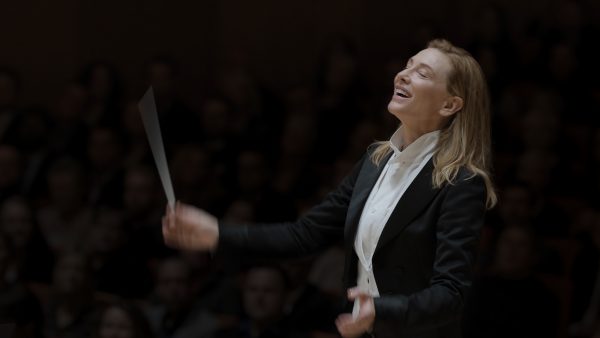
The key in this, of course, is unlocking the nature of Lydia’s beliefs, for they ultimately shape the nature of the existence she experiences thanks to the conscious creation process, the philosophy that maintains we manifest our reality through the power of these resources. It’s apparent that Lydia may not be well versed in this school of thought – or even precisely what her beliefs are to begin with. But, then, that would help to explain the contradiction that exists between what she thinks she should seek to achieve and what actually results. The surprises that occur truly seem to baffle her, but, considering the belief standpoint from which she operates (and her lack of knowledge thereof), this really shouldn’t be dumbfounding, at least to anyone who has enough cognizance to recognize the intentions that are being put forth and what eventually results from them.
Lydia’s biggest error in this is that she appears to be concerned more with the outcomes she wants than with any of the consequences that can result by not adequately thinking things through. This is better known as the practice of un-conscious creation or creation by default, through which manifesting beliefs are developed with due consideration for the sought-after goals but little or no attention is paid to the potential side effects or ancillary concerns that can occur along the way. When we engage in this practice, we may indeed end up with what we seek, but the result could arise in a distorted form because those aspects of the materialization may not be properly considered during the creation process. That can leave us with more messes to clean up and fires to extinguish than anticipated, keeping us from relishing the success we attain otherwise. Is that really worth it?
That’s the question that Lydia is continually being forced to ask herself as her story unfolds. For example, in her pursuit of Olga, is the fleeting erotic satisfaction Lydia derives from that experience worth potentially losing her partner, her daughter and her comfortable home life, not to mention possibly causing undue complications within her circle of orchestra colleagues? And this is just one example of the many little dramas playing out in her life that carry the potential for significant losses. Imagine what might happen if they all blow up all at once.
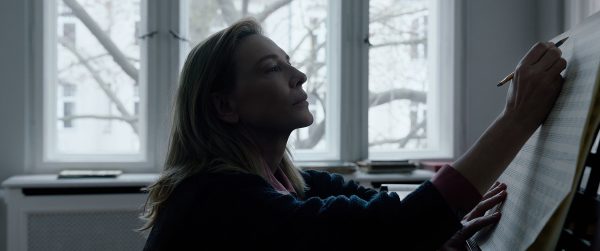
It’s obvious that Lydia needs to do some heavy-duty soul-searching, but the problem with that is that she may not even recognize the need to take on this task, let alone know how to proceed with it. As she stares down from her ivory tower, she may well come up with excuses for not doing so, deflecting the need to address this issue and tidily sweeping it under the rug – that is, until some greater problem arises that requires attention and reminds her once again of the need to follow through on this consideration. But, each time this happens, the question is repeatedly raised, “Will she do it?”
If the foregoing issues are perpetually left unaddressed, the aforementioned comeuppance is almost certain to arise at some point. So then what? The combination of consequences that could emerge from this might well leave Lydia scrambling to stay afloat. The great Ms. Tár could end up facing the greatest challenge of her career, if not her life. On some strange level, given her highly driven nature, maybe that’s what she’s been out to create for herself all along. But is this really the right way to go about it? Only Lydia can answer that for herself. And, if she keeps going the way she has been, she’ll have a lot more to answer for as well.
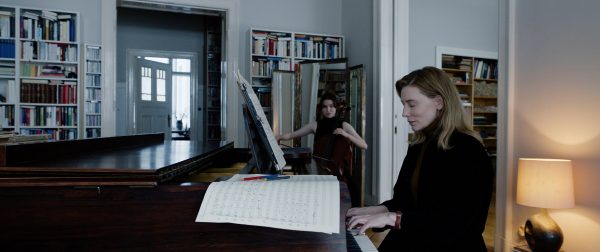
“Tár” is unquestionably one of the most unusual offerings of 2022. And, while much of writer-director Todd Field’s latest – his first film in 16 years – succeeds, there are sequences that could definitely use some work, especially at the outset of this somewhat overlong release. This tale of a brilliant, compulsively driven maestra manages to muster its share of dramatic tension and artistic exuberance, but it also leaves its share of loose ends and unclear motivations, making viewers wonder why events unfold as they do (and even more so about why they should care). It’s a work that also leaves open the question of whether this is innately a grand tragedy or a tongue-in-cheek exercise in pretention (again, something more to make audiences wonder why they should care). But perhaps the biggest irritant is the picture’s annoying and tiresome tendency (especially early on as the story is establishing itself) to break into protracted, insular discussions about classical music (and the business of it) that sound more like classroom lectures (or professional gossip) than bona fide believable dialogue. Obviously the screenplay for this project was scrupulously researched, but do viewers really want to know the finer points of its subject matter in such exacting detail?
Much to its credit, however, the film features what is perhaps one of Cate Blanchett’s finest screen performances (a likely Oscar contender), a finely tuned ramping up of the escalating pathos the further one gets into the narrative and a positively superb classical music score. And this current theatrical release is likely to capture a boatload of nominations in multiple categories as awards season unfolds. Is all that enough to save the film, though? I’d provisionally say yes, but, if none of this sounds like it would appeal to you, I’d recommend that you give this one a pass and rent one of the protagonist’s many other fine releases instead.
Copyright © 2022, by Brent Marchant. All rights reserved.



